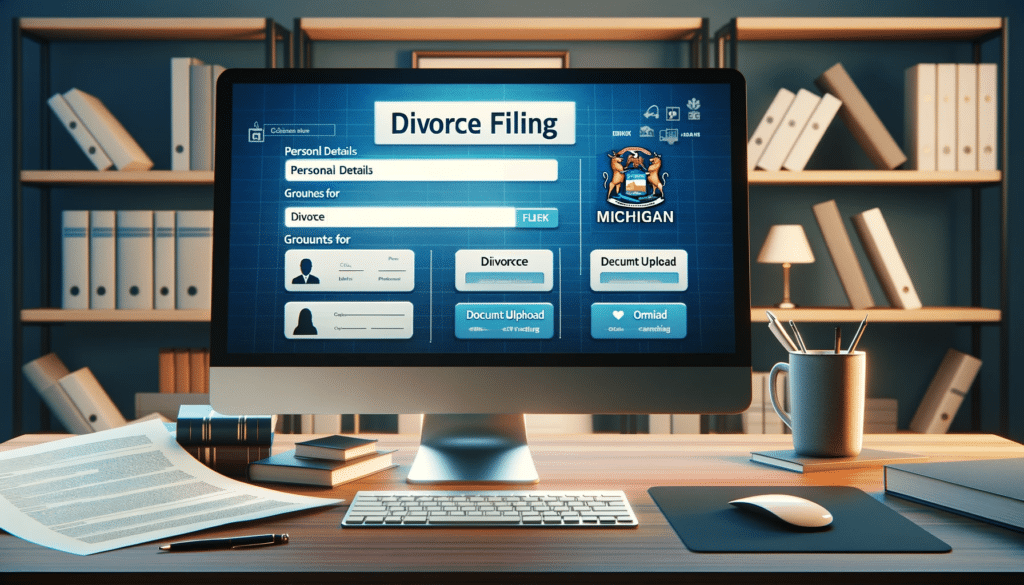Physical Address
304 North Cardinal St.
Dorchester Center, MA 02124
Physical Address
304 North Cardinal St.
Dorchester Center, MA 02124

Embarking on the process of filing for divorce in Michigan can feel like navigating the vast waters of the Great Lakes. It’s a journey that intertwines complex legal procedures with personal emotions.
Michigan’s divorce laws have their own unique set of rules and requirements, creating a distinct path to follow.

From understanding residency requirements to tackling the intricacies of legal paperwork, each step is crucial. But, this journey need not be overwhelming. This article is like your navigational chart, guiding you through the complexities of Michigan’s divorce laws.
We’ll simplify the legal jargon and touch on the emotional aspects of this path. Are you ready to chart your course toward a new beginning in the Wolverine State? Keep reading to uncover the key steps in filing for divorce in Michigan, and set sail toward a new chapter in your life.
For more on how to file for divorce, check out our article, How to File for Divorce: A Concise Guide for Couples.
Before filing for divorce in Michigan, you have to make sure you meet the residency requirements.
To be eligible for divorce in Michigan, either you or your spouse must have lived in the state for at least 180 days before filing the complaint.
Additionally, one of you must have resided in the county where the complaint is filed for a minimum of 10 days before the filing date.
However, there are exceptions to the 10-day county residency requirement in certain circumstances. For instance, if your spouse was born in another country and there is a risk of the child being taken out of the U.S., the 10-day requirement may not be applicable.
Also, if you want to file for divorce in Michigan but your spouse lives out of state, additional residency requirements may apply.
You’ll want to consult with an attorney or review the specific county or court rules to fully understand the residency requirements based on your situation.
| Residency Requirement | Description |
|---|---|
| State Residency | Either you or your spouse must have lived in Michigan for at least 180 days before filing the complaint. |
| County Residency | At least one of you must have resided in the county where the complaint is filed for a minimum of 10 days before the filing date. |
| Exception to County Residency | There are exceptions to the 10-day county residency requirement for certain situations, such as when there is a risk of the child being taken out of the U.S. |
| Additional Residency Requirements | If your spouse lives out of state, there may be additional residency requirements to consider. Legal advice is recommended in such cases. |
When it comes to filing for divorce in Michigan, the state operates on a “no-fault” basis. This means that you are not required to prove that your spouse’s actions caused the breakdown of your marriage.
The main grounds for divorce in Michigan are based on the belief that there has been a significant breakdown in the marriage relationship, and there is no reasonable chance of reconciliation.
In Michigan, the law states that the objects of matrimony must have been destroyed to such an extent that there is no realistic possibility of saving the marriage. This allows individuals to file for divorce without assigning blame to one party or the other.
By taking this approach, Michigan aims to simplify the divorce process and minimize conflicts during the proceedings.
The specific reasons for seeking a divorce in Michigan can vary from couple to couple. Some common reasons include marital misconduct, such as adultery or abuse, as well as irreconcilable differences and long-term separation.
However, Michigan law does not require individuals to disclose specific reasons when filing for divorce. Instead, a simple statement that the marriage has irretrievably broken down is sufficient for the court to grant a divorce.
Michigan’s no-fault divorce law allows couples to end their marriage without having to prove fault or wrongdoing. This can help reduce conflict and protect the privacy of those involved.
It also allows couples to focus on resolving issues such as property division, child custody, and spousal support, rather than spending time and resources on proving fault.
By focusing on the breakdown of the marriage rather than assigning blame, Michigan aims to make the divorce process more efficient and less adversarial.
When you are ready to file for divorce in Michigan, follow the proper steps to ensure a smooth process.
Here is a step-by-step ovreview to help you navigate the filing process:
| Step | Description |
|---|---|
| 1 | Eligibility |
| 2 | Grounds for Divorce |
| 3 | Preparing for Divorce |
| 4 | Preparing Forms |
| 5 | Where to File |
| 6 | Filling Out Forms |
| 7 | Filing Forms |
| 8 | Serving Papers |
| 9 | Responding to Petition |
| 10 | Financial Disclosures |
| 11 | Filing Without an Attorney |
When filing for divorce in Michigan, make sure you prepare the necessary forms accurately. Whether you have an uncontested or contested divorce, filling out the appropriate paperwork is crucial to move forward with the process smoothly.
If you’re unsure which forms you need, consider consulting with a lawyer or using online resources specific to Michigan divorce. Having a clear understanding of the required forms will help you gather all the necessary information and ensure that your divorce filings are complete.
Common forms for divorce in Michigan may include:
These forms may vary depending on the circumstances of your divorce, such as whether you have children or if there are specific financial considerations.
Take your time to accurately fill out each form, double-checking all the information provided. Mistakes or missing information could lead to delays or complications in the divorce process.
| Form Name | Purpose |
|---|---|
| Complaint for Divorce | Initiates the divorce process by stating the grounds for divorce and other relevant information. |
| Summons | Notifies your spouse that a divorce case has been filed against them and provides instructions for responding. |
| Verified Statement | Provides financial information such as income, expenses, and assets. |
| Uniform Child Custody Jurisdiction and Enforcement Act (UCCJEA) Affidavit | Details information about child custody, visitation, and the child’s residence. |
| Uniform Child Support Order | Calculates the amount of child support to be paid by the noncustodial parent. |
| Confidential Information Form | Provides personal information about the parties involved in the divorce case. |
| Friend of the Court Handbook | Explains the roles and responsibilities of the friend of the court, including child support enforcement and dispute resolution. |
These forms are commonly used in Michigan divorce cases but may not encompass all the forms required in your specific situation.
Remember to review the instructions carefully and consult with legal resources or professionals to ensure the accurate completion of all necessary forms.
When going through the process of filing for divorce in Michigan, one of the important steps is filling out the necessary forms. These forms require accurate and detailed information to ensure a smooth divorce process.
To complete the forms correctly, follow these guidelines:
Start by collecting the necessary personal information about you and your spouse. This includes full names, addresses, dates of birth, and Social Security numbers. Having this information handy will make it easier to fill out the forms accurately.
The divorce forms will also require information about your marriage. You will need to provide the date of marriage and the grounds for divorce, which is typically a breakdown of the marriage. If you and your spouse have already separated, that information should be included as well.
If you have children, you will need to provide information about them in the forms. This includes their names, dates of birth, and current living arrangements. You will also need to outline custody and visitation arrangements, as well as child support details if applicable.
In Michigan, both parties in a divorce are required to make financial disclosures. This involves providing information about income, assets, and debts. Ensure that you accurately disclose all financial information to avoid any complications during the divorce process.
| Form | Purpose |
|---|---|
| Complaint for Divorce | Initiates the divorce process and outlines the grounds for divorce |
| Summons | Notifies the other party of the divorce filing |
| Verified Statement, also known as Financial Affidavit | Provides detailed financial information |
| Child Custody and Parenting Time Order | Establishes the custody and visitation arrangements for children |
| Child Support Formula Worksheet | Calculates the amount of child support to be paid |
Carefully review the instructions for each form and fill them out accurately. Mistakes or omissions can cause delays in the divorce process. If you are unsure about any aspect of filling out the forms, consider seeking legal advice or assistance from a qualified professional.
Here is a step-by-step guide on how to file the divorce forms in Michigan:
First, you need to gather all the required forms for your divorce in Michigan. The specific forms you will need to complete depend on whether you have an uncontested or contested divorce, as well as if there are children involved.
Some common forms include the Complaint for Divorce, Summons, and Judgment of Divorce. You can obtain these forms from the Michigan Courts website or the local courthouse. Make sure to accurately fill out all the required information.
In Michigan, you will file your completed divorce forms in the family division of the circuit court in the county where either you or your spouse resides. It’s important to file the paperwork in the correct court to ensure the proper handling of your case.
You may need to check with the local court clerk to determine if electronic filing is required in your county.
Once you have completed the necessary forms and located the appropriate court, you are ready to file the paperwork. Take the completed forms to the courthouse and submit them to the court clerk. At this time, you will also need to pay the filing fee. The court clerk will provide you with a case number, which you should keep for future reference.
By following these steps, you can successfully file your divorce forms in Michigan and initiate the divorce process. Remember to consult with an attorney or seek legal advice if you have any questions or concerns throughout the process.
| Step | Description |
|---|---|
| 1 | Prepare the necessary divorce forms, including the Complaint for Divorce, Summons, and Judgment of Divorce. |
| 2 | Locate the family division of the circuit court in the county where either you or your spouse resides. |
| 3 | File the completed forms with the court clerk, pay the filing fee, and obtain a case number. |

In Michigan, divorce cases are handled by the family division of the circuit court in the county where either spouse lives.
This means that you will need to file your divorce papers at the courthouse in the appropriate county.
Each county may have specific requirements, so check with your local court clerk to ensure you follow the correct procedures.
Some courts in Michigan now require electronic filing, which means you may need to submit your divorce forms online instead of in-person. Electronic filing allows for greater convenience and efficiency, as you can complete and submit your paperwork from the comfort of your own home.
However, if electronic filing is not available in your county, you will need to submit your forms in person at the courthouse.
Once you file your divorce papers, the court will assign a case number and assign a judge to your case. Keep track of your case number and any correspondence from the court. Be sure to follow any instructions or deadlines provided by the court to ensure your divorce proceedings progress smoothly.
Serving papers means delivering a copy of the divorce papers to your spouse in accordance with the court rules.
There are different methods of serving divorce papers in Michigan.
One common method is personal delivery, where you or a third party hand-delivers the papers to your spouse. Another method is mailing the papers by registered or certified mail with return receipt requested. This provides proof that the papers were delivered.
To serve the papers correctly, follow the specific procedures outlined by the court. Make sure you understand the rules and guidelines for serving papers in your county.
Following these procedures will ensure that the service is legally valid and that the court can proceed with the divorce process.

If you have been served with a petition for divorce in Michigan, you’ll need to respond in a timely and appropriate manner.
Responding to a divorce petition involves addressing the allegations made by your spouse and asserting your rights and interests in the divorce proceedings.
When you receive a petition for divorce, you have a limited period of time in which to respond. Typically, the deadline for response is 21 days after you have been served with the papers.
Failing to respond within the specified timeframe can have negative consequences, such as a default judgment being entered against you. Therefore, you should act promptly and consult with an attorney if necessary.
In your response, you will need to address each allegation made by your spouse in the petition. This may involve admitting or denying the claims, and providing any additional relevant information or counterclaims.
Be thorough and accurate in your response, as it will form the basis for the court’s understanding of your position in the divorce proceedings.
If you are unsure about how to respond to a divorce petition or need legal advice, it is recommended to seek the guidance of an experienced family law attorney. They can help you navigate the complex legal process, protect your rights, and ensure that your interests are properly represented throughout the divorce proceedings.
| Step | Action |
|---|---|
| 1 | Review the petition for divorce carefully to understand the allegations made by your spouse. |
| 2 | Consult with an attorney to get legal advice and understand your rights. |
| 3 | Prepare your response, addressing each allegation and providing any necessary counterclaims or additional information. |
| 4 | File your response with the court within the specified timeframe, typically 21 days after being served. |
| 5 | Serve a copy of your response on your spouse or their attorney according to the court rules. |
| 6 | Continue to work with your attorney throughout the divorce proceedings to protect your rights and interests. |
While representing yourself can save money on legal fees, you’ll want to understand the complexities of the divorce proceedings. You will be responsible for preparing and filing the necessary paperwork, including financial disclosure forms.
Be sure to gather all relevant financial records, including bank statements, tax returns, pay stubs, and documents related to assets and debts. Accurate and complete financial disclosures are crucial, as any discrepancies or omissions can have serious legal consequences.
If you are unsure about how to complete the financial disclosure forms, consider seeking guidance from online resources or legal aid organizations.
Remember, navigating the divorce process without an attorney can be challenging, especially when it comes to complex financial matters.
It’s always advisable to consult with a legal professional who can provide personalized advice and ensure your rights and interests are protected throughout the divorce proceedings.
To see how this process of filing for divorce in Michigan compares to that in other states, check out our articles about how to file for divorce in Ohio and filing for divorce in Indiana.
To file for divorce in Michigan, you or your spouse must have lived in the state for 180 days before filing the complaint, and one of you must have lived in the county where the complaint is filed for at least 10 days before the filing date.
No, Michigan is a no-fault divorce state, so you do not need to prove any specific cause for the divorce.
There are two types of divorces: uncontested, where both parties agree on all issues, and contested, where there are disagreements that need to be resolved through court proceedings.
The filing fees for divorce in Michigan in 2023 are $175.
You will need to file your divorce papers in the family division of the circuit court in the county where either spouse lives.
You will need to prepare various forms, including a Complaint for Divorce. The specific forms required may depend on whether you have an uncontested or contested divorce, and if there are children involved.
When filling out divorce forms in Michigan, you will need to provide accurate and detailed information about you, your spouse, your marriage, and, if applicable, custody and support arrangements for children.
After preparing your divorce forms, you will need to file them with the court. In some courts, electronic filing may be required. You will also need to pay the filing fee.
To serve your spouse with the divorce papers in Michigan, you can use methods such as personal delivery or mailing by registered or certified mail with return receipt requested.
If you are served with a petition for divorce in Michigan, you will need to respond within a specified time period. It is advisable to consult with an attorney or seek legal advice to understand your rights and obligations.
In a divorce in Michigan, both parties are required to make financial disclosures, providing information about income, assets, and debts. The specific requirements may vary depending on the county or court rules.
Yes, you can file for divorce in Michigan without an attorney. However, it is important to familiarize yourself with the legal process and rules to ensure you are properly representing yourself. Online resources and legal aid organizations can provide guidance and assistance.